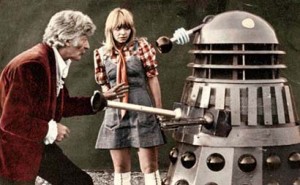 Welcome to the thirty-fourth instalment of Who Review, my ongoing quest to review all available episodes of TV’s longest running SF series, Doctor Who. This week, season 9 opens with the triumphant return of the Daleks in Day of the Daleks.
Welcome to the thirty-fourth instalment of Who Review, my ongoing quest to review all available episodes of TV’s longest running SF series, Doctor Who. This week, season 9 opens with the triumphant return of the Daleks in Day of the Daleks.
EPISODES
Day of the Daleks
BROADCAST DATES
1 January – 22 January 1972
THE DOCTOR
Jon Pertwee
THE COMPANIONS
Jo Grant
THE EPISODES
Sir Reginald Styles, a British diplomat working from the stately Auderly House, is attempting to avert a potential world war by organising a peace conference at the mansion. Unfortunately the Chinese have withdrawn from the conference and Sir Reginald is planning a trip to China to persuade them to return to the table.
Sir Reginald is working in his study when a soldier wielding a futuristic weapon bursts into the room. Before the soldier can fire, however, he disappears. Styles calls in his secretary and tells her he has seen a ghost.
Due to the importance of the peace conference, UNIT are called in the next day to investigate. However, Sir Reginald is now denying the presence of the ghost, although the Doctor discovers muddy footprints in the study.
In the grounds outside, the soldier reappears through a vortex. He is attacked by two alien creatures known as Ogrons, who severely injure him. UNIT troops find the injured soldier and arrange to transport him to a nearby hospital. The Doctor examines his weapon and a small black box found in a nearby tunnel system. He determines that the weapon is of human origin and that the box is a makeshift time machine!
Attempting to activate the device results in the reappearance of the time vortex, and the soldier disappears. The unit then overloads, rendering it useless.
The Doctor and Jo decide to stay the overnight in Auderly House. The next morning, three soldiers led by a woman called Anat appear from the time vortex. Theytake out a squad of UNIT troops and enter Auderly House.
One of the soldiers, Shura, encounters the Doctor, who is working in the study on repairing the time machine. He attempts to stop the Doctor from activating the device but fails when the Doctor takes him down with Venusian karate. Shura begs the Doctor to deactivate the device.
In the 22nd century, the activation of the time machine is detected by a human Controller, who reports the incident to his Dalek overlords. The Daleks command the Controller to track the signal and exterminate whoever has activated the device. They establish a time vortex magnetron that will ensure that anyone travelling between the centuries will be drawn to the Controller’s HQ.
Back in the 20th century, Anat takes Jo prisoner. She demands that the Doctor deactivate the device. He complies. It soon becomes apparent that Anat believes the Doctor to be Sir Reginald, who the soldiers have come to assassinate.
Meanwhile, Captain Yates and Sargent Benton have entered the house, searching for the missing UNIT squad. Anatimprisons the Doctor and Jo in the basement then sends Shura to make contact with their people in the 22nd century. Unfortunately, Shura only has time to retrieve a bomb from the nearby tunnels before being attacked by Ogrons. He is wounded but manages to escape.
Back in the mansion, a call is received from Brigadier Lethbridge-Stewart. Anat frees the Doctor long enough for him to talk to the Brigadier, who informs him that Sir Reginald has been successful and the peace conference delegates will be arriving at Auderly House the next day. The Doctor assures him that everything is fine at the mansion, but drops subtle hints as to the dangers posed by the soldiers. After the conversation, the Brigadier decides to travel to Auderly to see for himself.
In the basement, Jo manages to escape. She retrieves the time machine box and threatens to destroy it, but the vortex activates and Jo disappears into the future, materialising in the Controller’s HQ. The Controller sweet talks Jo and manages to learn exactly where and when she came from.
The Daleks use this information to travel back to the 20th century and launch an assault on Auderly House. Anat flees into the tunnels. The brigadier and his men arrive to fend off the assault and the Doctor pursues Anat.
 In the tunnels, the Doctor avoids confrontation with a Dalek and finds Anat just as she activates her time machine. He is swept up in the vortex and transported into the 22nd century. There, he discovers a world enslaved by the Daleks. At a slave mining operation, he makes contact with the factory manager, a rebel sympathiser. Unfortunately, the Doctor is captured by Ogrons. The Controller arrives and takes him to see Jo.
In the tunnels, the Doctor avoids confrontation with a Dalek and finds Anat just as she activates her time machine. He is swept up in the vortex and transported into the 22nd century. There, he discovers a world enslaved by the Daleks. At a slave mining operation, he makes contact with the factory manager, a rebel sympathiser. Unfortunately, the Doctor is captured by Ogrons. The Controller arrives and takes him to see Jo.
Meanwhile, Anat has returned to her rebel cell and made contact with Monia, the cell leader. Monia is contacted by the factory manager, who informs him of The Doctor’s arrival. Monia determines that the Daleks are afraid of the Doctor and decides that the cell must rescue him.
In the Controller’s headquarters, the Doctor learns that the Daleks have developed time travel technology. The Controller explains that a bloody 100-year war began on Earth in the late 20th century, resulting in the death of 7/8ths of the world’s population. With humanity greatly weakened, the Daleks invaded, conquering the world and using its mineral resources to fuel the expansion of their empire. Some humans, like the Controller and his ancestors, co-operated with the Daleks, although most humans were enslaved.
Meanwhile, the rebels stage their assault, freeing the Doctor and taking him to their base. Monia explains that, during the peace conference organised by Sir Reginald, Auderly House was blown up and all of the delegates were killed. This led to the 100-year war that devastated humanity. The rebels believe that Sir Reginald himself was responsible for the destruction, hence their attempts to travel back in time and kill him.
The Doctor is unconvinced; Sir Reginald is stubborn, but he genuinely wants the peace conference to succeed. Piecing together the events of that fateful day in the 20th century, he determines that the rebels are trapped in a predestination paradox; they are responsible for the explosion that kills Sir Reginald and the delegates, thus creating the very war they seek to prevent.
Back in the 20th century, his theories are proving correct, as the injured Shura has returned to Auderly House and placed the bomb in his possession in the manor’s basement.
Back in the 22nd century, the Doctor and Jo return to the tunnels, hoping to travel back in time and disarm the bomb. They are ambushed by the Controller, but when the Controller learns that The Doctor can prevent the Dalek invasion, he lets them escape. His efforts result in his own execution, but the Doctor and Jo manage to return to the 20th century, a squad of Daleks in hot pursuit.
As the delegates arrive for the peace conference, the Daleks and Ogrons attack. Fortunately, the Doctor convinces Shura not to activate the bomb, allowing UNIT troops time to evacuate the delegates. With the house overrun by Daleks but empty of all humans, Shura activates the bomb, destroying the invaders.
Outside, The Doctor informs Sir Reginald that it is up to him to make the peace conference a success, as they now know what will happen should he fail.
MY THOUGHTS
I love time paradoxes. It’s one of my favourite elements of SF storytelling. Day of the Daleks employs one of the absolute classic paradoxes – the time traveller who returns to the past to prevent a future invasion, only to have his actions lead to the very disaster he’s trying to avert.
It’s rare to see a Whostoryline that incorporates the nature of time into its plot, but Day does so effectively, even introducing the Blinovitch Limitation Effect into the series to explain why the rebels can’t continually send soldiers back to kill Sir Reginald. I’m surprised time isn’t used more often as a plot device during the series.
This is one of the few Dalek stories not written by Terry Nation, the Dalek creator. At the time, Nation was a consultant on The Persuaders and was unavailable, although he is credited as Dalek creator for these episodes.
The original script didn’t even feature the Daleks; the Ogrons were the villains when the story was conceived. The plan was for the Daleks to return for the season finale, in a tale called The Daleks in London. However, the producers decided they needed a strong hook to open the season, something to equal the first appearance of the new Doctor in Season 7 and the Master in Season 8, so the story was rewritten into a Dalek story.
The only real flaw in Day of the Daleks is the final confrontation between the Daleks and the UNIT soldiers. There were only 3 Dalek props available during the production. Some clever editing could have hidden or overcome this fact, much like it did with the Cybermen in The Invasion. Unfortunately, lacklustre directing during the final battle merely highlights the limitations of the production and removes much of the tension of the confrontation. Even the addition of the Ogrons doesn’t help, and what could have been an absolute classic Who tale fizzles under an anticlimactic ending.
Despite this, Day is still an strong story. For the most part, excellent writing and some wonderful performances overcome the lacklustre directing, crafting a powerful opening to the season.
THE DOCTOR
There’s a moment in most Dalek episodes when the Doctor first learns of the villain’s involvement in the story. These moments are pivotal to the success of the story and rely on the Doctor to sell the threat posed by his greatest enemy. Jon Pertwee delivers in fine style, instantly establishing that the mere presence of the villains ups the stake and the threat to our heroes.
There’s a rather uncharacteristic moment in Day when the Doctor shoots an Ogron dead. It’s almost unheard of to see the Doctor using a gun, let alone killing somebody with it. This is especially telling given that he wasn’t even being attacked by the Ogron at the time. It’s an atypical moment that really stands out in an otherwise excellent showing by the Doctor.
THE COMPANIONS
Whenever the Daleks appear, the attention almost invariably shifts off the companions and onto the Doctor. This isn’t surprising, as the Daleks are the Doctor’s mortal enemy and he’s been shown to go to extreme lengths in combating them. Day of the Daleks is no different and it is one of Jo’s weaker appearances to date, especially when she is sweet-talked by The Controller. She doesn’t show much of the independence or resourcefulness of past episodes. Hopefully, this won’t be a trend in the remainder of Season 9.
THE VILLAINS
The Daleks make their triumphant return after 5 years! During the Patrick Troughton era, several efforts were made to create villains that could replace them as the premier Who villains, most notably the Cybermen and the Ice Warriors. Unfortunately, there really is no substitute for the Daleks, and their return is a welcome one. Doctor Who just hasn’t been the same without them.
There’s no real explanation for how the Daleks returned after their apparent destruction in Power of the Daleks. Honestly, it doesn’t matter; just seeing them in Who once again is enough.
The Ogrons are a minor, but relatively interesting addition to the Dalek story, although I’d have liked to have seen a little more about their race. Hopefully we’ll learn more about them in their future appearances.
FINAL THOUGHTS
While not the classic it could have been, Day of the Daleks is still an excellent story with a strong hook and some fantastic performances.
4 Lukes
NEXT
The Doctor returns to space once more to confront The Curse of Peladon.









This was such a wasted opportunity…a brilliant beginning with the first two episodes being compulsive viewing. And then they went and ruined it…by putting the Daleks in the story (yes I realise that without them the title may have been a little…ummm…misleading). I know I’m on my own here but the Daleks were a great idea in the beginning but then lost their way by the Pertwee era due to some lazy (yes LAZY) script writing. In fact what script writing I here me say??? ‘It is the Doctor, the Doctor is the enemy of the Daleks, he must be exterminated, exterminate, exterminate'(just cut and paste into all Dalek episodes because it’s the crux of every conversation they have)…the smartest brain in the universe and his greatest nemesis in the universe are the most monotoned, one dimensional, repetitive, moronic (yes moronic – they’ve got their greatest adversary tied to a table and they let a human convince them not to kill him…aaaaaggggggghhhhhhhhh)pepper-pot heads…no wonder Pertwee hated working with them!!!! Thankfully Davros was created and they finally became interesting and more importantly, had their storyline developed to such an extent that now they have a history and a family tree! So for me the first half is genius and the second half a complete sell-out. And the Brig and Jo are this eras strengths (obviously along with Pertwee and Delgado)and when they’re given nothing to do the show is the worse for it. Oh and I think you mean Evil not Power…but then who’d know when none of us have seen either of them!
Wow, that is a harsh assessment of the Daleks. I can’t say that I agree with you, as I loved the Daleks in this story. They’ve had their eyes set on Earth since The Dalek Invasion so having them finally succeed in conquering Earth works well for me. The fact that the only way they can be defeated is to send soldiers back in time to prevent them from conquering Earth in the first place in a great way of showing just how dangerous the Daleks are. It’s a good way of reintroducing them after the lengthy absence from the series.
I don’t think the writing in Day is lazy. What really lets the story down is the lacklustre directing, especially in the final episode. Paul Bernard really could have learned something from Douglas Camfield’s efforts in the Invasion.
I can’t comment on the rest of the Dalek appearances from the Pertwee era just yet. I know Terry Nation returns for their next appearance, so maybe things will pick up them.